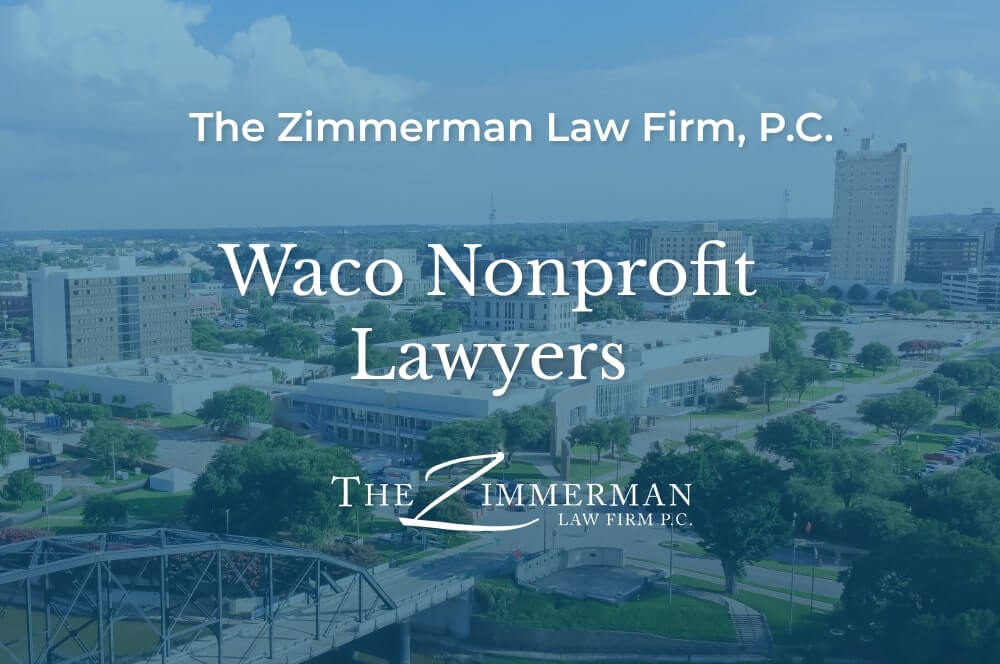
If you’re looking to make a difference in your community and have a specific cause you’re passionate about, forming a nonprofit corporation in Texas may be the way to go.
A nonprofit corporation is a legal entity that is designed to operate for the purpose of serving a specific public or charitable purpose, rather than for profit.
In Texas, the process for establishing a nonprofit corporation is relatively straightforward, but there are some key steps you should be aware of.
You can read more about the steps to form a nonprofit in Texas below. If you have any questions, please contact our Waco nonprofit lawyers online or call (254) 252-3590.
How Do I Create a Nonprofit in Texas?
Establishing a nonprofit can be a rewarding way to effect positive change in your community. Entrepreneurs should take care when forming their businesses to ensure they follow the proper steps.
Missteps or errors, even minor mistakes, can delay the process or lead to adverse consequences for the nonprofit and its tax-exempt status.
The below guide provides a general framework for how to create a nonprofit in Texas. For specific advice on your unique situation, we encourage you to talk to our experienced business formation lawyers.
Step 1: Choose a Name for Your Nonprofit Corporation
Before you can start the process of forming a nonprofit corporation in Texas, you need to choose a name for your organization. Your name should be unique and not already in use by another organization in Texas.
Additionally, the name cannot state or imply that the nonprofit does something unlawful or forbidden by the laws of Texas.
Step 2: Determine the Purpose of the Nonprofit
When forming most types of businesses, the purpose can be quite broad (typically, “any lawful purpose”) and does not need to meet many requirements so long as the purpose is not to engage in illegal activity.
In Texas, nonprofits must be formed for specific types of purposes, such as:
- Serving a charitable, religious, or civic purpose;
- Running a professional or trade association or labor union;
- Engaging in raising and breeding livestock; and
- Running a nonprofit cooperative association.
It is very important that you and your team take care to identify the purpose of the nonprofit and ensure that its operations move toward that goal. Being clear about the unmet needs that your nonprofit will help to fulfill sets a strong foundation for the nonprofit.
Missteps can jeopardize the business’s tax-exempt status, so consulting a nonprofit lawyer along the way can be beneficial.
Step 3: File a Certificate of Formation
To form a nonprofit corporation in Texas, you need to file a certificate of formation with the Texas Secretary of State.
The certificate of formation should include the name of your organization, the purpose of your organization, and the names and addresses of your initial board of directors.
You’ll also need to include a statement indicating that your organization is formed for charitable purposes and that it will not engage in any activities that are not allowed for tax-exempt organizations under federal law.
Step 4: Apply for Tax-Exempt Status
To receive tax-exempt status from the IRS, you’ll need to file Form 1023, Application for Recognition of Exemption Under Section 501(c)(3) of the Internal Revenue Code.
This form requires detailed information about your organization, including its purpose, activities, and financial information.
The time it takes the IRS to review and process an Application for Recognition of Exemption Under Section 501(c)(3) of the Internal Revenue Code can vary, but on average it takes between three to six months.
Once your application is approved, you’ll be granted tax-exempt status and your donors will be able to deduct their contributions to your organization on their tax returns.
Contact a Waco Nonprofit Lawyer Today
Forming a nonprofit and obtaining tax-exempt status from the IRS can be a complex and time-consuming process.
Our experienced attorneys have the necessary, specialized knowledge to guide you through the process of forming a non-profit organization.
At The Zimmerman Law Firm, it is our privilege to be able to support our Central Texas community by helping Central Texans pursue their dreams of creating nonprofit organizations.
Our nonprofit attorneys can help you navigate this process and ensure that your documentation is accurate and complete to avoid any potential delays or issues and set you up for long-term success.
If you’re ready to start your own nonprofit, contact The Zimmerman Law Firm online today or call (254) 252-3590.
Where You Can Find Our Waco, TX Office
Nonprofit FAQ
To start a nonprofit in Texas, you need to form a corporation and file your certificate of formation with the Texas Secretary of State’s office. You’ll also need to draft bylaws, appoint a board of directors, obtain an employer identification number (EIN), and apply for tax-exempt status with the Internal Revenue Service (IRS).
Nonprofits in Texas may be eligible for exemption from state sales and franchise taxes, but must still pay federal income tax on any unrelated business income. Nonprofits must also file annual tax returns with the IRS.
To apply for tax-exempt status, you must first obtain a federal tax identification number (EIN) from the IRS. You can then complete and file Form 1023 with the IRS to apply for recognition of tax-exempt status. You may also need to file additional forms with the Texas Comptroller’s office.
Nonprofits in Texas can generate revenue and earn a profit but must reinvest those funds in the organization’s mission rather than distributing them to shareholders or owners. Additionally, nonprofits must comply with federal and state laws regarding tax-exempt status and unrelated business income.
